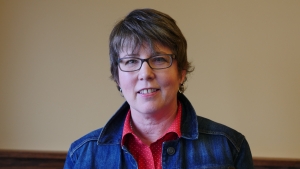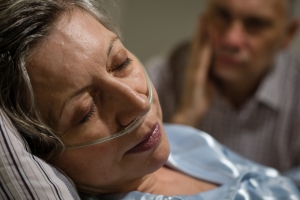news article
Called to be a Hospice chaplain
December 6, 2017 / By Rev. Becky Naber, Baker Memorial UMC
Editor’s Note: This article originally appeared in the Fall 2017 issue of the Advocate, which featured stories that showcased the theme of “Being God’s love to our neighbors in all places.”

As a Deacon appointed to Hospice Buffalo, I work on an interdisciplinary team consisting of a physician, nurse, and social worker. My role is to serve as a channel of God’s grace in the spiritual care of the terminally ill patient and their loved ones. While many people speculate that Hospice work must be terribly dreadful and emotionally overwhelming, I full-heartedly love my job and my calling to this ministry of compassion and reconciliation. For although we live in a death denying culture, I have found the last months, days, and even hours of life can be the most transformative and peaceful should we embrace God’s gift of assurance.
Blessed assurance brings peace and meaning at the end of life. In his works on Christian Perfection, John Wesley said that wholeness is possible in this life as we respond and grow in God’s grace and become more and more Christ-like in our love and actions. But our ability to know the fullness of God’s love and to perfectly reflect the love of Christ most often occurs at the hour of our death. A terminal diagnosis accelerates the desire for the assurance of one’s salvation.
 A terminal diagnosis reorders one’s life. When a person is faced with impending death, many questions arise concerning life’s meaning and spiritual beliefs. In other words, confronting our mortality radically shifts our perspective; much that has been important in the past may either grow significantly or diminish in its relevance to our well-being. During this sacred and intense time of reflection and spiritual exploration, religious beliefs and practices may be of great comfort and provide meaning to a patient’s illness and decline. Or, past spiritual hurts and disappointments may result in anger or extreme fear of the Divine. As a chaplain, I listen to spiritual unrest in such questions as “Why me?” or “I deserve this for all the bad things I have done.” Spiritual anguish can be caused by a multitude of things, but most likely it develops out of a need for reconciliation in our relationships or a desire to continue caring for loved ones. Either way, patients find themselves in need of a deeper connection with God’s forgiveness and love.
A terminal diagnosis reorders one’s life. When a person is faced with impending death, many questions arise concerning life’s meaning and spiritual beliefs. In other words, confronting our mortality radically shifts our perspective; much that has been important in the past may either grow significantly or diminish in its relevance to our well-being. During this sacred and intense time of reflection and spiritual exploration, religious beliefs and practices may be of great comfort and provide meaning to a patient’s illness and decline. Or, past spiritual hurts and disappointments may result in anger or extreme fear of the Divine. As a chaplain, I listen to spiritual unrest in such questions as “Why me?” or “I deserve this for all the bad things I have done.” Spiritual anguish can be caused by a multitude of things, but most likely it develops out of a need for reconciliation in our relationships or a desire to continue caring for loved ones. Either way, patients find themselves in need of a deeper connection with God’s forgiveness and love.
The Spirit leads me to holy ground. Each morning I receive a list of new patients as well as my schedule for the day with established patients (many people are in Hospice care for many months). I meet with five to six people a day. They are persons of all ages, all faiths, all denominations, and in all stages of belief and emotional balance. With each patient’s name and the entry of their address into my car’s GPS, I leave the office filled with wonder for what God has in store for us (the patient and me):
- Will this family receive me as a stranger bearing God’s hope into their household?
- Will my patient be at spiritual peace and ready to die when they are called home to the Lord? Or, will they be spiritually broken, longing for reconciliation with God, with the church, with a spouse, with a child or a sibling?
- Will they need help in seeing God’s presence throughout their life?
- Or will they want to hear Psalms of God’s love and promises?
The questions go on and on in my mind, and so does my surprise as to where and how God calls me to share divine love and hope.
God places me in roles I never before imagined, over and over again. Reconciliation is a common end-of-life need; and I’ve been tasked with reuniting estranged loved ones with a patient for their peaceful passing. Other times, I’ve been called to homes to offer God’s comfort and promises as I gather a family around the bed of a loved one who has passed or is about to cross through the veil. I’ve been given the privilege of hearing beautiful parting words of love between spouses. I’ve heard confessions, anointed the sick, and prayed with patients who long for a deeper sense of the Lord’s nearness and for God’s protection over their loved ones in their absence.
Of the multiplicity of roles, one of my favorites is to pray with patients who long for God’s blessing of assurance—they long to be pardoned and justified; to know they belong to the Lord and abide with Christ. Whatever the day may bring, my joy is seeing the transformative work of God in patients as they are spiritually healed and as they peacefully pass from this life toward the glory that awaits them in the next.
Some situations require an ever closer walk with God. Pediatric chaplaincy is one example. I serve as the chaplain for the Essential Care Unit, which provides Hospice and palliative care to ill children and their families. In this work, I provide spiritual care to women who struggle with difficult perinatal diagnosis. I walk with them through their pregnancies, birth, and afterwards. I also visit with parents and children all ages who have a life-threatening chronic condition or terminal diagnosis. Here too are questions concerning God’s presence (or perceived absence), of God’s love and mercy, and here too I share God’s love. More often than not, I share the tenants of our hope in God and how these children radiate God’s goodness and show us how to love—in simple and in extraordinary circumstances. Yet sometimes, words cannot capture the pain of a parent; standing in solidarity with them, wrapped in divine love is all that I have to offer as my heart prays they find hope and peace in our compassionate God.
Hope and blessed assurance are part and partial to our Methodist roots. While we often sing this beloved 19th century hymn in worship, its realization of a peace that surpasses all understanding is most relevant in the face of the unexpected and the end of one’s life. Assurance counterpoises our fears and doubts. Assurance undergirds our belief that we each are a beloved child of God—that God’s greatest gift to us is Christ and that the Lord delights to abide with each one of us.
And assurance draws us deeper and deeper into the love of God towards our prize of perfection. At the end of my day’s work at Hospice, my evening prayer for each of my patients and their families is for them to claim God’s promises, and for them to know the joy of salvation in this life in preparation for an eternity to come. For each day as this hymn resonates in my mind, I find myself awestruck by the mystery and compassion of God’s grace in birth, throughout life, and in death. And it is with great joy and humility that I am called to guide Hospice patients towards “a foretaste of glory divine.”